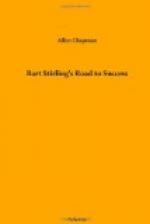“You see here the value of keeping notes of everything,” he panted, on reaching Bart—“nothing is lost in this world, however small. Here we are: ‘County at large.’ Now then, in my private notes: ‘Allessandro’ uncommon name—’look up—probably Greek.’ ’Alaric, Altemus, Artemas, Benno, Borl, Bud—derived from Budlongor, Budmeister—Buck’—I’ve got it: ’Buckingham, last name Tolliver, residence: Millville, occupation none.’ Hold on. We’ve got the clew—now for the town record.”
The Professor again flitted away to the house, and darted back again with a new volume in his hand.
“Here you are!” he cried, selecting a printed page. “’Millville, population two hundred and sixty, not on railroad. R.S.T. Tappan, Tevens, Tolliver’—Ah, ‘Buckingham Tolliver, Henry Tolliver,’ must be brothers, I fancy. That’s all I’ve got on record. Information any use to you?”
“Is it?” cried Bart, in profound admiration of the old bookworm’s system. “Professor, you are the wisest man and one of the best men I ever met!”
CHAPTER XVIII
A DUMB FRIEND
At three o’clock that afternoon Bart Stirling sat down to rest at the side of a dusty country road, pretty well tired out, and about ready to return to Pleasantville.
When old Professor Cunningham gave him the names Buck and Hank Tolliver, Bart was positive that the same covered the identity of the two men who had been at the Sharp Corner with Lem Wacker.
Bart had started at once for Millville. His first intention was to get a conveyance at the livery stable, his first impulse to solicit the co-operation of the town police.
While discussing these points mentally, however, a farmer driving west came down the road. He had a good team, said he was passing through Millville, seemed glad to give Bart a lift, and so it was that the young express agent found himself on the solitary lookout there, two hours before noon.
He experienced no difficulty whatever in finding out all about the Tollivers inside of twenty minutes after his arrival.
They were the last members of a shiftless, indolent family who had lived on the edge of Millville for twenty years.
When the father and mother died the family broke up. The two boys, Buck and Hank, kept bachelor’s hall at the ricketty old ruin of a house on the river until ejected by its owner for non-payment of rent, and then went to the bad generally.
They patched up an abandoned shack over on the bottoms, the postmaster at Millville told Bart, and lived by fishing, hunting and their depredations on orchards and chicken coops.
In one of their nightly forays about a year previous they were captured and fined heavily. They could not pay the fine and were sent to jail for six months.
About the first of June they were released, came back to Millville, found their old shack burned down, and since then, the postmaster understood, had camped out in the woods, giving the town a wide berth—in fact, only occasionally appearing, to buy a little flour, sugar or coffee, or, mostly, tobacco.




